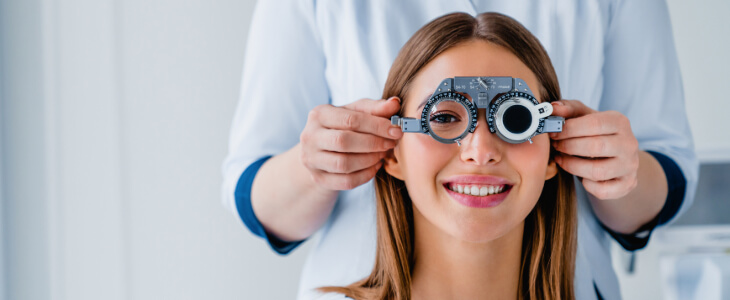Ophthalmologists are doctors who deal with medical and surgical treatments of the eyes. Like other doctors, they are held to a high standard of care due to the education and training required to practice. Patients trust that when they see an eye doctor, they will receive a high level of care. Unfortunately, this does not always happen, and some patients end up as victims of ophthalmologist malpractice.
Medical malpractice is not just a breach of the doctor-patient relationship, it can also have serious and even permanent health consequences. If you are a victim of an ophthalmologist’s malpractice, the attorneys at Cooper Schall & Levy can help you obtain compensation for your injuries.
What Do Ophthalmologists Do?
The word “ophthalmology” is not a particularly common word. Yet this area of medicine is a significant one, if for no other reason than that it involves one of the most sensitive parts of the human body: the eye. An ophthalmologist specializes in eye and vision care. These are professionals with years of education and training, and they are licensed to practice medicine and perform surgeries.
Some of the services that ophthalmologists offer include:
- Vision services, such as eye exams
- Diagnosis and treatment of eye problems
- Medical and surgical care, e.g., to correct glaucoma or remove cataracts
- Identifying health issues not directly related to the eye
Ophthalmologists are sometimes confused with optometrists and opticians, although these latter two professions require different training and allow different degrees of practice.
How Can An Ophthalmologist Commit Malpractice?
In addition to the rigorous training that all ophthalmologists receive, some of them also specialize in certain anatomical parts of the eye, or in the treatment of certain diseases. There are numerous potential mistakes an ophthalmologist could make. Some of the more common ones include:
Failure to diagnose and delayed diagnosis. All eye doctors are trained to use reasonable care in identifying and treating eye problems. A negligent ophthalmologist may fail to diagnose an eye disease in a timely fashion, or may not diagnose it at all. A delayed or failed diagnosis may cause additional problems that would not have occurred but for the ophthalmologist’s failure to use reasonable care. For some patients, these complications may include partial or total vision loss, which may be irreversible.
Failure to treat and delayed treatment. Perhaps the correct diagnosis was made, and was made on time. But if the condition is not treated expeditiously, the result may be permanent vision loss.
Surgical errors. All surgeries come with a certain degree of risk, but a doctor is trained to use care to minimize the likelihood that something disastrous will happen. When surgical errors occur, they often involve cataract and LASIK work.
Failure to consult a third-party expert. There are some circumstances in which the ophthalmologist does not have the expertise to know what to do. If a patient has a condition that the doctor cannot treat, he or she should refer the patient to someone who does. Failure to do so may be considered malpractice.
Medication errors. These occur when the ophthalmologist prescribes the wrong medicine or prescribes it in the wrong dosage. The result of this could be uncomfortable or even painful side effects, or the error could aggravate an underlying condition.
Failure to follow up with a patient. After a surgical procedure, the ophthalmologist may need to follow up with the patient to check for any post-operative problems. The same is true after other work to diagnose or treat a patient’s condition. Not following up may allow side effects of surgery to go untreated, or may result in other issues for the patient.
What Are The Consequences Of Ophthalmologist Malpractice?
Typically, ophthalmologist malpractice will lead to one or more problems which include:
- Damage to the eye
- Decreased vision
- Temporary or permanent blindness
- Infection
- Other vision problems
These, in turn, may require additional medical work to correct the mistake. In the process, the patient will likely incur medical bills, lost time from work, and suffer other damages.
What Does a Lawyer Have To Prove in an Ophthalmologist Malpractice Case?
In any Pennsylvania medical malpractice case, it is essential to prove the following:
- The doctor owed the patient a duty of care
- That duty of care was breached
- The breach resulted in harm to the patient
- The harm resulted in damages
Breaching the duty of care involves some degree of negligence on the part of the ophthalmologist. This tends to be the most hotly contested part of a malpractice case, although the nature and degree of damages will also be disputed. Depending on your case, damages arising from ophthalmologist malpractice may include:
- Medical bills, including those incurred to treat errors resulting from the malpractice
- Costs for prescription drugs to treat side effects and other complications
- Pain and suffering
- Missed time from work
- Any damages from a resulting disability
Each of these will vary in degree from one patient to another. It is important to retain the services of a Pennsylvania malpractice attorney who is experienced and capable of proving each element of a malpractice claim.
Is There A Time Limit To File An Ophthalmologist Malpractice Claim?
In most Pennsylvania malpractice cases, the victim has two years from the date of malpractice to bring a lawsuit. However, this deadline may be extended if the victim did not discover, or could not have reasonably discovered, the error until later. If you suspect that you’ve been the victim of malpractice, you should seek legal counsel right away to observe any time limits that may apply to your case.
Contact Our Dedicated Law Office For The Help You Need
The ophthalmologist malpractice attorneys of Cooper Schall & Levy know what it takes to defend the rights of patients who have been victimized by medical negligence. Count on us to fight for the compensation you need and deserve in compliance with MCARE. Call our office today for your consultation.
Cooper Schall & Levy medical malpractice lawyers serve Philadelphia, Pennsylvania as well as neighboring counties such as Montgomery County and Delaware County and cover neighborhoods such as Norristown and Drexel Hill.


